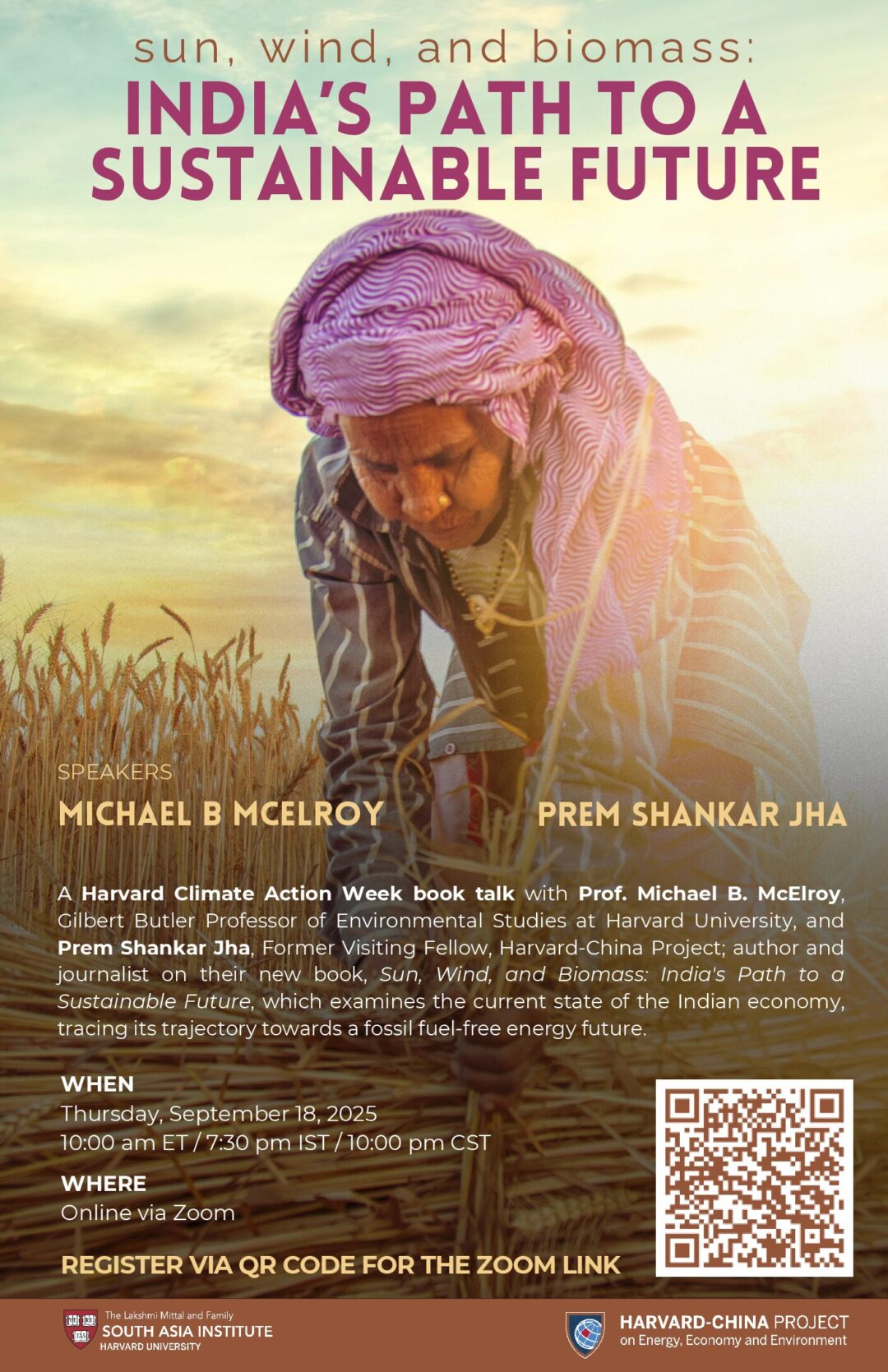10:00 am ET / 7:30 pm IST / 10:00 pm CST
A Harvard Climate Action Week book talk with Prof. Michael B. McElroy, Gilbert Butler Professor of Environmental Studies at Harvard University, and Prem Shankar Jha, Former Visiting Fellow, Harvard-China Project; author and journalist
Join Prof. Michael B. McElroy and journalist Prem Shankar Jha as they discuss their new book, Sun, Wind, and Biomass: India’s Path to a Sustainable Future. The book examines the current state of the Indian economy, tracing its trajectory towards a fossil fuel-free energy future. It posits that harnessing sun, wind, and biomass can provide a sustainable economic alternative to polluting energy sources such as domestic coal and expensive oil and gas imports. Such a transition is projected to provide substantial benefits not only for the national economy but also for public health, the latter occasioned by the anticipated improvements in air quality resulting from the projected change in the energy system. Contrary to the concerns about the negative implications for economic development, the authors suggest that the transition to a carbon-free future offers a range of beneficial opportunities, especially for the youth in impoverished rural environments. Thus, they situate India’s transition away from fossil fuels within the context of planet Earth’s history, underscoring the abruptness of humanity’s encounter with the reality of a potentially devastating and relatively immediate change in global climate.
Speaker Bios:
Michael B McElroy
Michael B. McElroy is the Gilbert Butler Professor of Environmental Studies at Harvard University and Chair of the Harvard-China Project on Energy, Economy, and Environment. With a distinguished career spanning over six decades, Prof. McElroy has been a pioneering force in atmospheric research, where he has focused on the causes and impact of human-induced stratospheric ozone depletion and climate change. More recently his research has broadened to include also energy sciences and addressing the decarbonization imperative in rapidly developing countries such as China and India as well as high-income ones like the United States. Through his career he has authored more than 300 journal articles, four single-authored books, and three edited volumes. He joined Harvard University in 1970, and has since held various posts: Director of the Center for Earth and Planetary Physics (1975-1978); founding Chair of the Department of Earth and Planetary Sciences (1986-2000); Chair of the University-wide Committee on the Environment (1991-2001); and the first Director of the Center for the Environment (2001-2004). He has been, since 1997, the Gilbert Butler Professor of Environmental Studies.
Prem Shankar Jha
Prem Shankar Jha is a former Visiting Fellow, Harvard Paulson School of Engineering and Applied Sciences (SEAS). He has served at the United Nations Development Programme, New York, Damascus, and Syria. As a journalist, he has been associated in an editorial capacity with Hindustan Times and The Times of India, and has been a columnist for The Hindu, Outlook, and Business Standard. During 1989-90, he was the Media Advisor to the then Prime Minister of India. He was awarded the ‘Energy Journalist of the Year’ by the Washington-based International Association for Energy Economics in 1988. He has also received two Lifetime Achievement awards for journalism from the Shriram Foundation and the Mumbai Association of Journalists (The ‘Red Ink’ award) in 2019 and 2021, respectively. Apart from being a Visiting Fellow at Harvard University, he was a Visiting Professor at Sciences Po during 2007-08.
This event is part of Harvard Climate Action Week. Sponsored by theLakshmi Mittal and Family South Asia Institute at Harvard University and the Harvard-China Project on Energy, Economy, and Environment, based at the Harvard Paulson School of Engineering and Applied Sciences.
About Harvard Climate Action Week
From September 15–21, schools and departments across Harvard will host events and activities highlighting innovative research and interdisciplinary approaches to the climate and energy challenge. Building on this, the Harvard Climate Symposium: Pathways for Progress on Energy and Climate, taking place September 19–20, will convene hundreds of experts to share real-world solutions and explore how rigorous evidence can inform meaningful change and impact. View the Harvard Climate Week Agenda.

